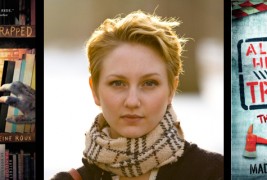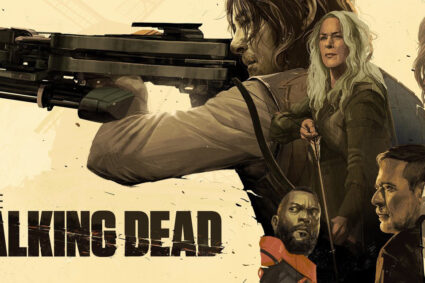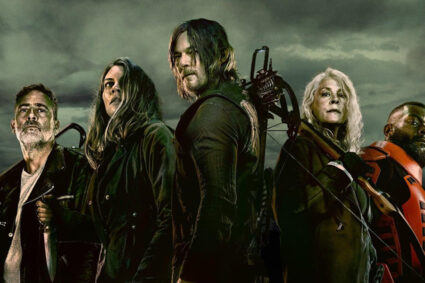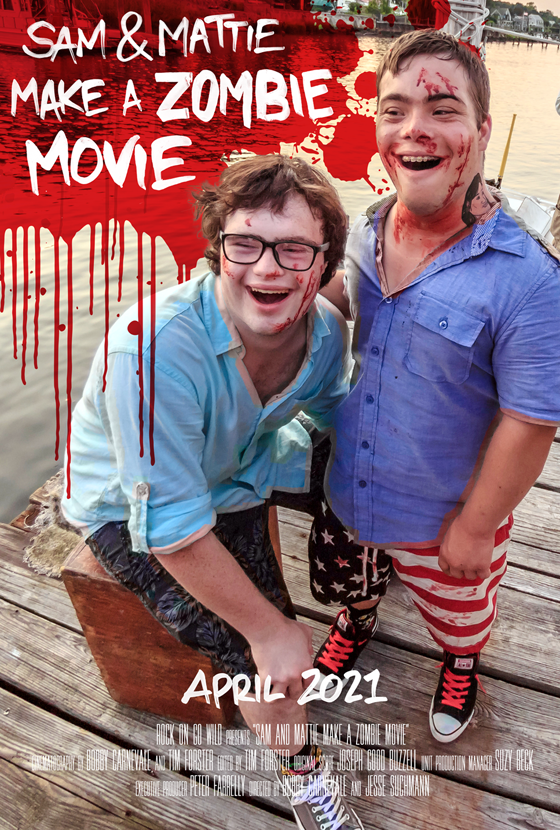
My path to this interview was a strange one. Let me explain:
Back in February I was reading through Fangoria issue 301, cover-to-cover as I’m wont to do, when I got to the book reviews section. The featured “Book of the Month” was yet another zombie novel. This one was called Allison Hewitt is Trapped and the picture on the cover was from a Zombie’s perspective, its grey, rotting hands have pushed aside books on a shelf to reveal a young woman standing defiantly on the other side, facing us and holding an ax at the ready. I was surprised that a walking-dead-centric book was given Fango’s lofty BOTM status, but the reviewer had made no bones about it as she extolled the book’s “smarts” as well as its refreshing lack of clichés – a huge virtue seeing as how it belongs to a subgenre that’s beyond well-worn at this point. Having been a huge fan of zombie film and fiction prior to the zombie overload, I put Allison Hewitt is Trapped on my to-read list.
Here’s a quick biographical fact about yours truly to help contextualize this weird journey. I earned my B.A. in English as a Creative Writing major from Beloit College, a small private college in southern Wisconsin and the self described “Harvard of the Midwest”. Of the undoubtedly several “Harvards of the Midwest”, Beloit’s reputation is well-earned. It’s a fantastic school, internationally reputable and boasting an outstanding writing program. In my case Beloit’s writing program was also a generous and forgiving one as I was awarded the opportunity to complete an Honors project – an amateurish abomination of a screenplay entitled, “The Secret of Last Chance”. One of the more tangible benefits of having gone to Beloit College is that I continue to receive Beloit College Magazine, a quarterly publication that encompasses all things Beloit.
In early April as I was thumbing through the latest copy of Beloit College Magazine, I flipped over one of the magazine’s last pages and there she was staring me in the face – the titular character from the cover of the book on my to-read list, standing defiantly, ax still at the ready. It was Allison Hewitt and she was still trapped. I had some combination of déjà vu, out of body experience, acid flashback, maybe even a near death experience, I’m not entirely sure. Whatever happened, I flipped my lid.
The article accompanying the picture of Allison Hewitt is Trapped was a profile of the book’s author, Madeleine Roux, Beloit College class of 2008, B.A. in English as a Creative Writing major and awarded Honors for writing a novel. Sound familiar? I promptly contacted Ms. Roux for an interview – a no-brainer, of course, and went out the very next day to buy her book.
Madeleine’s story is incredible. Allison Hewitt is Trapped started as a blog – a way for Madeleine to blow off some creative steam, but it quickly gained a following and before long readers were offering survival advice to “Allison” in the blog’s comments section. Soon every aspiring writer’s dream befell Madeleine: A literary agent found her blog and offered her the opportunity to turn the zombie apocalypse online adventure into a book. Madeleine signed a two-book deal with St. Martin’s Press, officially rewarding her countless hours of hard work. And here’s the kicker, she’s only 26 years old, she’ll school you in all your favorite video games, and she still finds the time for weekend Dungeons & Dragons marathons. Madeleine Roux can flat out write and Allison Hewitt is Trapped is exactly the type of high-concept, well-executed, and thoughtful horror Ravenous Monster seeks to expose to fans of our beloved genre.
I caught up with Madeleine to get her thoughts on her meteoric rise, the horror genre, and various other topics. Please read on….
RavMon: What were your career plans before your blog was discovered?
Madeleine: My career plans were more or less the same – I knew I wanted to be a novelist or somehow work in a creative writing field. The path I would take to get to that career is what changed. I was looking at graduate study before the blog became a success, and I had applied for a few jobs that were focused a bit more in journalism.
RavMon: Growing up, which stories inspired you to pursue writing?
Madeleine: It’s a bit embarrassing, but I really loved the Anne Rice vampire novels. That was one of the first series that I got really hooked on. I loved following characters from book to book, and I was impressed by the scope. My Mom read a lot of Jane Austen, and I started reading her work from a young age. I loved (and still love) Austen’s characters. There’s so much subtlety and wit behind her women, they have a kind of quiet power that I find inspiring. Gary Jennings has a great series on the ancient Aztec civilization – aptly titled Aztec – and I ate those books up. They were gory and raunchy but also heavily, heavily researched. I love pulp history like that, stories that make you wince and laugh and cheer.
RavMon: If my memory serves me, Beloit College isn’t exactly a breeding ground for genre fiction, which makes your first publication extra cool in my eyes. What was your writing output like during your college days?
Madeleine: It was literary, definitely. That didn’t bother me. I think you need to have a strong foundation, understand the basics and what makes the classics classic, and then go off in your own direction. I wrote a historical pieces, because research is always a great way to start off with an idea, and I think they tend to be more genre in some ways – there’s a magic to recreating 16th century Italy or medieval England. It’s an interest that transfers well to sci-fi or fantasy or whatever you want to write.
RavMon: Zombies are hot right now, but they may be cooling off a bit due to over exposure. However, you came along and injected some much needed intelligence and originality to the mix. Why zombies?
Madeleine: I don’t have a good answer for that, actually. I mean, it wasn’t ‘It came to me in a dream’ or anything like that, but I had the idea for the character and the circumstances just gelled. Too often I think protagonists in zombie fiction have an innate skill that allows them to succeed, which is totally fine and can be a lot of fun, but I wanted someone who didn’t have any of those requisite talents. Allison doesn’t know how to fire a gun or have survival training, she just figures it out as she goes along. I do think zombies are a great way to lend your story a constant sense of dread and tension. They’re unpredictable, you never know when they’ll turn up. They can also be a stand in for whatever symbol you want to play with. It seems like they represent something different in every zombie story, and that’s unique to zombies, I think.
RavMon: Are you afraid of being pigeon holed as the “female zombie writer”?
Madeleine: Yes and no. I mean, ultimately every writer wants to create a following. You want fans to like what you do and go with whatever story you put out. I won’t be writing zombie fiction forever, so choosing my next direction has been tough. You want the next project to be logical, to be different enough to be exciting but still have the qualities that attracted people to Allison Hewitt Is Trapped in the first place. I don’t want to be pigeon-holed, but it’s up to me to make sure it doesn’t happen by offering something new and exciting, whether it’s zombie-related or not.
RavMon: I understand you’re a bit squeamish when it comes to gore, but you’re obviously a fan of the zombie subgenre – a perilous existence to be sure. What are your zombie inspirations and how have you managed to endure their sloppier elements?
Madeleine: It’s weird, I don’t find gore in books or graphic novels problematic. In movies, I have a real sensitivity to guts for some reason. Certain types of gore I can deal with, but if the intestines show up I’m covering my eyes (I’m thinking most notably of that one scene in The Cell with the crank mechanism. Ugh, I still have nightmares about it). Fingernails, too. There’s a pretty iconic scene in Black Swan that gave me trouble. Luckily, zombie movies tend to be quite cartoony with gore, and that doesn’t bother me as much. It’s cliche, but most of the big hitters were inspirations – Dawn of the Dead, Shaun of the Dead, The Walking Dead, 28 Days Later, World War Z – they’ve all been in heavy rotation in my life at one point or another.
RavMon: Did you proactively seek readers for your blog or did a following develop on its own?
Madeleine: I had to put myself out there. That’s the beauty of the Internet, it’s hard to get a foot hold, but once you find your audience magical things happen. I got in touch with Pajiba.com, a blog that does movie, TV and book reviews. I knew they were my people. They’re sarcastic and they love zombies, and I just felt like they would have the perfect readership. After they linked to me, my readership spiked like crazy. I didn’t bombard other sites, as far as promotion goes, but I tried to strategically contact places I knew had the audience I was looking for.
RavMon: Few writers at any level possess a command of both the language and the ability to tell compelling stories. Most writers seem to lean one way or the other. However, Allison Hewitt represents both of these attributes. Most people with a formal background in writing can compose beautiful prose; it’s your command of the story that I find most impressive. What’s your approach to storytelling and how much emphasis do you put on formal elements such as structure and plotting?
Madeleine: Allison was a happy accident in a lot of ways. I give credit to my teachers and professors, who helped hammer into my head a solid foundation, but sometimes a story comes together with almost alchemical ease. Once I had a firm grasp on who Allison was, the plot became a no-brainer (har har) – she’s the kind of character that thrives in challenging situations, so I tried to make the trouble escalate, to give the readers a chance to watch her grow and overcome. I can be my own worst enemy when it comes to starting a new project. Inevitably I want to outline the thing to death, which can kill creativity. It’s hard to find a balance between organizing things in advance so you don’t run into trouble later, and letting the story develop naturally. ‘Plot’ has become kind of a dirty word in some literary circles, but there’s no story without plot. You can have the most amazing, interesting, funny character in the world, but if you don’t give them enough to do the story falls down before it even gets going.
RavMon: The tone of your book is uniquely dynamic as evidenced by the following two passages:
Pg. 123 (The last of a series of haikus each attributed to a character)
“What is a haiku?
I’m just a big stupid mutt;
Oh look! A pork bone.
-Take a wild fucking guess-
He’s licking his butt right now…”
Pg. 143
“Potential.
There are times when our potential grows weary of trembling in shadow and comes suddenly, violently to the fore. Like a song forced through our pores, or water crashing over a broken dam, that potential arrives, determined, demanding our attention. Maybe there are other things locked in that vault – maybe there’s more than just violence and deception and coldness. Maybe there is radiance, love, a kind of longing that singes you inside.
I return to my tent giddy, aflame, “Let’s Go Fly a Kite” stuck stubbornly in my head.”
Your narrative perspective is first-person and you weave between the crude-and-colloquial and the beautifully poetic. Yet, the shifts in language and the resulting shifts in tone aren’t jarring. Is this dynamic something you calculated for Allison or is it inherent to your general approach?
Madeleine: I wanted her to be like some of the academics I know. They’re pretty crass, irreverent people (myself included) but they also have a deep reverence for language and classic literature. I think when you study Shakespeare and Wilde and some of the other big names, you develop a sense of humor that translates well between new and old, because word play and pacing is timeless. I don’t think my approach to other characters will be the same as the one I took with Allison, necessarily, but I’m not sure I would ever choose to have a main character that didn’t at least partially share my sense of humor.
RavMon: Allison Hewitt is Trapped is a really good book, from cover to cover. However, I feel like it actually gains strength over its last third or so. It’s subtle, but it’s there. Do you agree? Was this book part of the novel-writing learning curve, a case of “it” clicking for you at some point during the course your writing?
Madeleine: It’s funny, because I’ve heard the exact opposite, that some readers preferred the beginning. You’re probably responding to the shift between more blog-oriented writing and more novelistic writing. The first half was written all on the blog and for the blog, and the second half was written knowing the whole thing had to end up as a cohesive book. I knew that difference was there, but I think it works. As the stakes get higher and higher, her writing becomes more story-oriented, more about detailing her struggle and her friends rather than giving a funny, day-to-day rundown of events. Some readers hated that. They wanted a blog, but it’s right in the title – Zombie Novel, not Zombie Blog. It’s in the style of a blog, certainly, but I would agree with you that it’s stronger when her focus is on recounting things more accurately and in a more dynamic way.
RavMon: It appears that with Sadie Walker is Stranded you’re establishing a motif with this series. Could you describe what that is as well as your approach to writing this follow up? Will there be more to come?
Madeleine: I actually don’t know if there will be a third in the series, right now it’s just the two, but that’s not set in stone. Sadie is different from Allison in that she’s older and has a bit more skill when it comes to survival. Her dad was an outdoorsman and she learned from him, so that allowed me to give her a bit more range in terms of what she can and can’t accomplish. If there’s a motif, I think it’s strong women coming into their own, learning they can be leaders, but not turning into paragons of right and wrong, necessarily. Both Allison and Sadie make a lot of mistakes, which I think is essential. Perfect characters are boring, and everyone fucks up in life from time to time. Sadie’s story is also more focused on learning to find her inner mother, since she takes on caring for her nephew. If Allison becomes the fighter she never knew she was, then Sadie becomes the mother she never knew she was. That makes it sound like Sadie Walker Is Stranded is a family drama or something, it’s not. There’s plenty of blood and guts to go around, and a few creative deaths for the gorehounds.
RavMon: Tell me about designing/writing games. Is that a target you’re eventually going to hit?
Madeleine: Giving up novels isn’t in the cards, but I would love to try my hand at writing for videogames. I think they have an incredible amount of potential when it comes to interactive stories. It’s exciting to think you can make a branching plot, and let players experience your story however they want to. I’m a sucker for games like Mass Effect and Dragon Age, where you craft a main character and give them the traits and skills you want them to have, and then you watch them influence their world and the people in it. I think for some writers it’s hard to imagine not being completely in control of how a story is experienced and told, but it seems like a fantastic challenge to me.
RavMon: Thank you!
Madeleine: My pleasure, thanks for the awesome questions.














